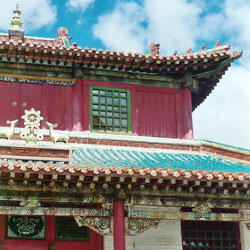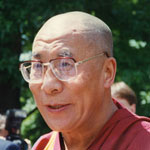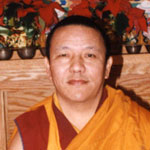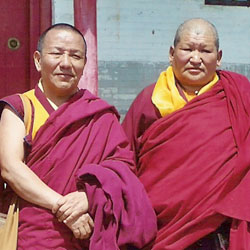Please make your donations to Tenzin Yignyen, 121 Hamilton Street, apartment 1, Geveva, NY 14456, USA.
For further information, please contact Tenzin by e-mail at yignyentenzin@yahoo.com or by phone at (315) 781-3058.

History
Shankh is the oldest monastery in Mongolia, founded in 1647 by Zanabazar (1635-1723), a revered sculptor, politician, religious teacher, diplomat and living Buddha, who became Mongolia's first Bogd Khan (God King). Known as the West Monastery, it was one of the foremost seats of Buddhist teaching and practice in the country for almost three centuries. At its height, Shankh consisted of several schools specialized in Tantric rituals, particularly the Kalachakra, philosophy and astrology. It housed over 1,500 monks and served the religious, medical and educational needs of the region.
In 1924, three years after thousands of Bolshevik forces had poured in from Russia, Mongolia became the world's second communist country. While an uneasy truce initially prevailed between the government and the monasteries, some of the latter's property and herds were seized in 1929, arrests and executions came in 1932 and a bloody purge began in earnest in 1937. The reign of terror against religion was ruthless and coincided with a drive to eliminate "rightist elements". It is believed that by 1939 some 27,000 people had been executed (3% of Mongolia's population), of whom 17,000 were monks.
It was in this context that in 1937 Shankh Monastery was closed, its temples burned and most of its monks arrested and executed or sent to labor camps in Siberia. Five monks who were only young boys at the time were spared and sent back to their families. During the 53 years of repression that followed, these five monks kept the teachings they had received alive at great risk to themselves, preserving sacred objects and scriptures, and holding secret meetings during which they performed the rituals and recited the prayers that had come to Mongolia from Tibet centuries earlier.
The collapse of the Soviet Union in 1990 led to decolonization by default in Mongolia and in May of that year the constitution was amended to permit multiparty elections in July. That same year the surviving Shank monks reopened the monastery and began the restoration of its main temple. While the communists have been in and out of power since that time, democracy has taken hold and religious persecution is now a thing of the past in Mongolia. Yet, the majority of Mongolians have experienced a sharp decline in living standards, education and health care. Mongolia remains a poor country, ranking 117th in the world on the United Nations' Human Development Indicator in 2003.
Shankh Monastery Today



Today a small monastic community once again practices at Shankh. It is composed of the five monks who survived the 1937 purge, now well into their 70s, a younger disciplinarian and a dozen or so monks ranging in age from about 9 to 21. With very limited means they have completed the restoration of the main temple but are lacking in everything needed to ensure the monastery's further development, such as teachers, writing materials and the means to house and feed the students, who continue to live with their families and depend on them to meet their basic needs, as well as to continue to rebuild and restore.

In 1993, responding to the request of senior Mongolian monks, His Holiness Tenzin Gyatso, the 14th Dalai Lama, sent three Tibetan monks from Namgyal Monastery in Dharmsala, India, to help foster a renaissance of Buddhism in Mongolia. One of those monks was The Venerable Tenzin Yignyen, who taught at Ganden Monastery in Ulaan Baatar from 1993 to 1995 and who now teaches Buddhist philosophy and arts at Hobart and William Smith Colleges in Geneva, N.Y.
Since 1995, Tenzin has maintained close ties with Mongolia in general and in particular with Shankh Monastery, whose spiritual and material development he continues to assist. In both June 2004 and June 2005, with the generous help of a few individuals, Tenzin provided Shankh with a cash infusion of $1,000 (U.S.), which was gratefully received by the monks and used for publishing the Buddhist texts and food. However, much more is needed to reestablish this monastic community and allow it to respond to the thirst for spiritual knowledge of the people of Western Mongolia.
